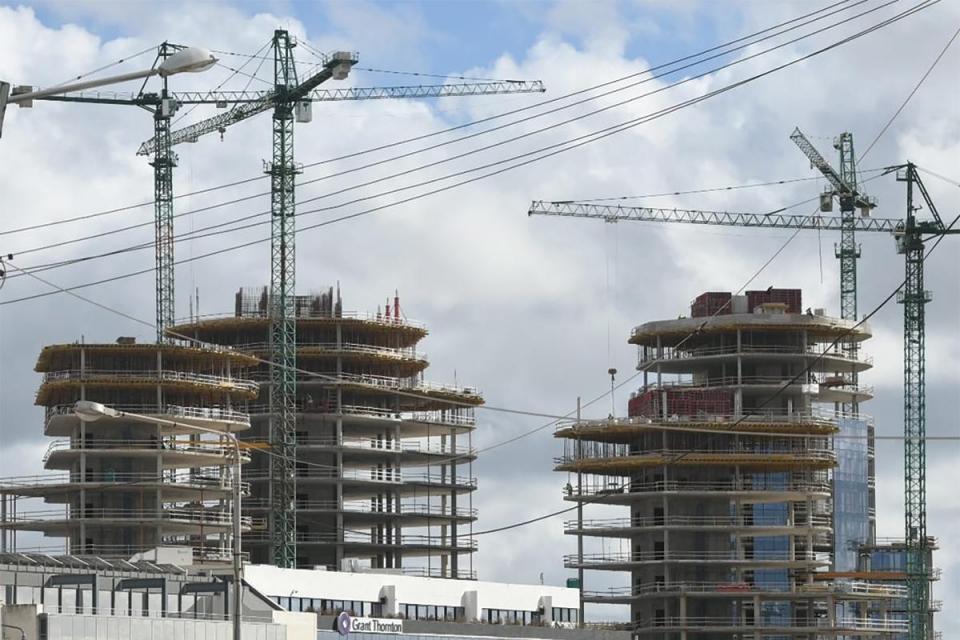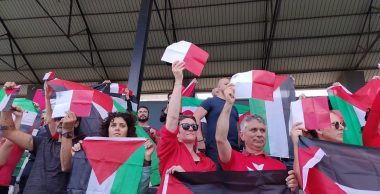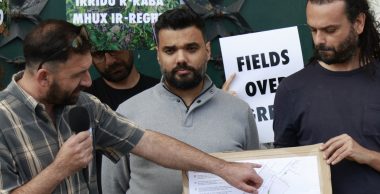There is little to see and enjoy during a session of the parliamentary committee for the environment, or to be precise, the environment and development planning committee. I’m not making this distinction out of pedantry – by the time you’ve read this, you’ll wonder why the word “environment” even features in the name.
Indeed, there’s no fun in being a sore black thumb in the room, sat in the midst of rather demotivated MPs ruminating buzzwords as PA executives ran everyone through the proposed local plan atrocities for Mrieħel and Marsa.
Environment Minister Aaron Farrugia kicked off proceedings by introducing the session, claiming that the revisions are being done to see “more economy” – as if he’s being kept awake at night by grandiose plans to satisfy his honourable colleague Ministers Schembri and Caruana. I won’t dwell on this phrase too much. It is, after all, a mere confirmation of the mindset that clouds our cabinet’s judgment, just another nail in the hopes of those who believe that economic growth should not dictate our everyday lives. But alas.
A PA representative outlined the new plans for Mrieħel and Marsa: the removal of building height limitations, with heights to be decided according to a set of non-measurables such as “the operational needs of the business, the underground development potential, the topography of the site, the proximity of sites/buildings that must be safeguarded and the impact upon the skyline”.
Everyone familiar with the PA will tell you how the authority itself has a track record of ignoring its own already very flimsy policies, so the previous line will read as a godsend for developers, speculators and architects circling the areas from up above.
The PA’s representative didn’t do much to allay our fears in this regard. At one point, she presented a powerpoint slide indicating the policy wording to be changed: a line striking through two full paragraphs of regulations, deleting conditions and caveats, leaving little other than a few insignificant words.
This is how we do planning in Malta; a process that makes us the envy of a decrepit favela in Rio.
It is indeed a sad state of affairs when decisions such as these are made by a handful of people in tiny committees. The cumulative impact of what’s been approved on January 12 has not been studied and there has clearly been no attempt to study, understand and mitigate the adverse effects of this sudden policy change. Residents and farmers are yet again those who stand to lose most.
The public, as well as the Kamra tal-Periti, sent in their comments. There was little to smile about for Farrugia and his people, who have gone from promoting urban greening one day, to standing up for the developers’ image the other and, finally, to allowing unregulated building heights in two industrial areas.
A cursory look at the major projects being proposed in that area may be enough to shock you back into your senses, if not frighten you into something worse.
In Mrieħel, Infrastructure Malta has been working under the cover of secrecy to build a new flyover which will take up huge swathes of arable land, courting controversy and opposition from farmers, Qormi residents, the PL-led local council and PL stalwarts. Further down the road, the roads agency is proposing a horrifying road project which will tear Msida in two for the sake of more cars. In Marsa, the new racecourse is expected to generate over 2,300 daily trips. In Qormi, rumours of a new flyover planned instead of the Luqa roundabout have been worrying residents and council. Seeing how things are panning out in that area, they’ve got full rights to more sleepless nights.
If we had to put all this on a map, it would look as messy as a debrief of the Battle of the Ardennes.
The race for the sky is bound to cause victims at ground level. During the hearing, we mentioned the adverse effects this policy change will have on farming, since it is now a given that, wherever infrastructure needs to be laid out, it will be at the expense of arable land. This prompted Agriculture Minister Anton Refalo to ask whether more arable land will be taken for this project before casting his vote.
Farrugia and PA CEO Martin Saliba both intervened to allay the minister’s fears, however, they both offered a guarantee which they themselves have no power to enforce.
As both know too well, roads and infrastructure fall within the remit of another minister and his urge to drive tarmac through every single field in Malta.
That, I would say, is a much bigger blasphemy than his nervous faux pas last week, while playing at home in an otherwise empty TV studio.
Ironically, Saliba devoted quite a bit of time to the defence of the Mrieħel road- widening project, the very same project that will rob us of more farmland and open spaces and which is being clumsily defended by the very same minister who gave him the top PA seat. (Under Borg, Saliba also worked as head of the EPRT tribunal while being seconded from the PA itself; a conflict of interest the size of a flyover which has, unsurprisingly, not cost him his job.)
Come the end of the hearing, the revisions were adopted.
It’s not over, of course, and we’ll fight tooth and nail against more years of endless construction, roadworks, loss of farmland, accidents and pollution… the most tangible result of more “economy”.
That very “economy” which doesn’t keep track of the simmering anger at the continuous attack on our quality of life and which is hacking away at the certainties of an increasing portion of Labour’s own electorate.
In wanting “more economy”, the environment minister should also be wary of these rumblings since it makes him no different to most of his cabinet colleagues and equally subject to electoral discontent.
Aħrax-Miżieb docet.
Wayne Flask, member of Moviment Graffitti




